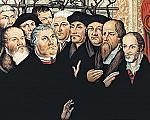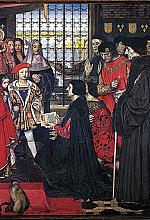Erasmus in context

[above: Summer Stamps (1936), Detail: Erasmus—State-owned Postal, Telegraph and Telephony (Netherlands), Hendrik Seegers, Sem Harz,E. Reitsma-Valença and R. Steinhausen / Public domain, Wikimedia]
The Eucharist
ERASMUS [God] wished those whom he redeemed with the body and blood of his Son to be nourished in some ineffable way by that same flesh and blood and to receive as a pledge the comfort of his mysterious presence, till he returns in glory. . . . Hitherto, along with all other Christians, I have always worshipped in the Eucharist the Christ who suffered for me, and I see no reason now to change my views. No human argument could make me abandon what is the universal teaching of Christendom. (Letter to Konrad Pelikan, 1525)
LUTHER What is the Sacrament of the Altar? . . . The true body and blood of our Lord Jesus Christ, in and under the bread and wine which we Christians are commanded by the Word of Christ to eat and to drink. And as we have said of Baptism that it is not simple water, so here also we say the Sacrament is bread and wine, but not mere bread and wine, such as are ordinarily served at the table, but bread and wine comprehended in, and connected with, the Word of God. (Large Catechism, 1529)
ZWINGLI I believe that in the holy Eucharist, i.e., the supper of thanksgiving, the true body of Christ is present by the contemplation of faith. This means that they who thank the Lord for the benefits bestowed on us in His Son acknowledge that He assumed true flesh, in it truly suffered, truly washed away our sins by His blood; and thus everything done by Christ becomes as it were present to them by the contemplation of faith. (An Account of the Faith of Ulrich Zwingli Submitted to the Roman Emperor Charles, 1530)
ANABAPTISTS By thus eating the bread and drinking the drink in memory of the suffering and shed blood of our Lord Jesus Christ . . . [we] have had fellowship one with another, and have all become one loaf and one body . . . we should properly become conformed to our Head and as his members follow after him. (Balthasar Hubmaier, A Form for Christ’s Supper, 1527)
CALVIN He has given another sacrament to his Church by the hand of his only begotten Son, viz., a spiritual feast, at which Christ testifies that he himself is living bread, on which our souls feed, for a true and blessed immortality. . . . As God, regenerating us in baptism . . . makes us his by adoption, so we have said that he performs the office of a provident parent, in continually supplying the food by which he may sustain and preserve us in the life to which he has begotten us by his Word. (Institutes, 1529, IV.xvii.1)
The church
ERASMUS Through [the Holy] Spirit you have reconciled heaven with earth, through it you have united so many languages, so many nations, and so many different kinds of people into the one body of the church, which through the same Spirit is joined to you, its head. . . . Set this chaos in order, Lord Jesus, let your Spirit spread out over these waters of doctrine that rage about to our detriment. . . . Bring it about that just as for all who dwell in your house there is one law, one baptism, one God, one hope, and one Spirit, so there also should be a single voice of the people who profess the Catholic truth. (Prayer to the Lord Jesus for Peace in the Church, 1532)
LUTHER Therefore the Church can never be better governed and preserved than if we all live under one head, Christ, and all the bishops equal in office (although they be unequal in gifts), be diligently joined in unity of doctrine, faith, Sacraments, prayer, and works of love, etc., as St. Jerome writes that the priests at Alexandria together and in common governed the churches, as did also the apostles, and afterwards all bishops throughout all Christendom, until the Pope raised his head above all. . . . For, thank God, a child seven years old knows what the Church is, namely, the holy believers and lambs who hear the voice of their Shepherd. (Smalcald Articles, 1537)
ZWINGLI All who dwell in the head [Christ] are members and children of God, forming the church or communion of the saints, which is the bride of Christ, ecclesia catholica [church catholic]. (67 Articles, 1523)
[To the Zurich assembly, 1523] As to claiming that such matters should be settled by a Christian assembly of all nations, or by a council of bishops, etc., I say that here in this room there is without doubt a Christian assembly. For I hope that the majority of us here desire, by the divine will and love, to hear and know the truth, which Almighty God will not deny us if we desire it to his honor, with right belief and right hearts.
ANABAPTISTS The Church of Christ is a lantern of righteousness, in which the light of grace is borne and held before the whole world, that men may also learn to see and know the way of life. (Peter Riedemann, Account of Our Religion, Doctrine and Faith, c. 1540–1541)
CALVIN Wherever we see the word of God sincerely preached and heard, wherever we see the sacraments administered according to the institution of Christ, there we cannot have any doubt that the Church of God has some existence, since his promise cannot fail. . . . The Church universal is the multitude collected out of all nations, who, though dispersed and far distant from each other, agree in one truth of divine doctrine, and are bound together by the tie of a common religion. (Institutes, IV.i.9)
The state
ERASMUS It is the part of a true Christian to shun carefully all vulgarity. It is the province of a prince to surpass all in stainless character and wisdom. You compel your subjects to know and obey your laws. With far more energy you should exact of yourself knowledge and obedience to the laws of Christ, your king! . . . The best laws under the best princes make a city or a kingdom most fortunate. The most felicitous condition exists when the prince is obeyed by everyone, the prince himself obeys the laws, and the laws go back to the fundamental principles of equity and honesty, with no other aim than the advancement of the commonwealth. (The Education of a Christian Prince, 1516)
LUTHER The temporal government has laws which extend no further than to life and property and external affairs on earth, for God cannot and will not permit anyone but himself to rule over the soul. . . . A [ruler’s] duty is fourfold: First, toward God there must be true confidence and earnest prayer; second, toward his subjects there must be love and Christian service; third, with respect to his counselors and officials he must maintain an untrammeled reason and unfettered judgment; fourth, with respect to evildoers he must manifest a restrained severity and firmness. (Temporal Authority: To What Extent It Ought to Be Obeyed, 1523)
ZWINGLI I venture to assert that no man is even capable of administering a magistracy properly unless he is a Christian. How, pray, does the state differ from the church? I mean in regard to the external habits and associations of life; for as far as the heart is concerned, I am well aware that the only church of Christ is that which trusts in Christ, while the state can be content if you show yourself a faithful citizen, even if you do not trust in Christ. (Commentary on True and False Religion, 1525)
ANABAPTISTS It does not befit a Christian to be a magistrate: the rule of the government is according to the flesh, that of the Christians according to the Spirit. Their houses and dwelling remain in this world, that of the Christians is in heaven. Their citizenship is in this world, that of the Christians is in heaven. The weapons of their battle and warfare are carnal and only against the flesh, but the weapons of Christians are spiritual, against the fortification of the devil. The worldly are armed with steel and iron, but Christians are armed with the armor of God, with truth, righteousness, peace, faith, salvation, and with the Word of God. (Schleitheim Confession, 1527)
CALVIN [The object of civil government] is, that no idolatry, no blasphemy against the name of God, no calumnies against his truth, nor other offences to religion, break out and be disseminated among the people; that the public quiet be not disturbed, that every man’s property be kept secure, that men may carry on innocent commerce with each other, that honesty and modesty be cultivated; in short, that a public form of religion may exist among Christians, and humanity among men. . . . Civil authority is, in the sight of God, not only sacred and lawful, but the most sacred, and by far the most honorable, of all stations in mortal life. (Institutes IV.xx.4)
War and peace
ERASMUS I appeal to all who call themselves Christians! I urge them, as they would manifest their sincerity, and preserve their consistency, to unite with one heart and one soul, in the abolition of war, and the establishment of perpetual and universal peace. (The Complaint of Peace, 1521)
LUTHER When I think of the office of soldier, how it punishes the wicked, slays the unjust, and creates so much misery, it seems an unchristian work and entirely contrary to Christian love; but if I think of how it protects the good and keeps and preserves house and home, wife and child, property and honor and peace, then it appears how precious and godly this work is. . . . For if the sword were not on guard to preserve peace, everything in the world must go to ruin because of lack of peace. . . . When men write about war, then, and say that it is a great plague, that is all true; but they should also see how great the plague is that it prevents. (Whether Soldiers, Too, Can Be Saved, 1526)
ZWINGLI How does it happen that we Christians who are united by such powerful agencies have much greater quarrels than unbelievers? And how does it happen that in a Confederacy in which until now a fraternal love prevailed, for the sake of foreign lords violent quarrel has arisen? Answer: Real piety, by which is meant true worship and prayer to God, has disappeared among us. (A Solemn Warning, 1522)
ANABAPTISTS The regenerated . . . are the children of peace who have beaten their swords into plowshares and their spears into pruning hooks and know of no war. They give to Caesar the things that are Caesar’s and to God the things that are God’s. Their sword is the word of the Spirit which they wield with a good conscience through the Holy Ghost. (Menno Simons, The New Birth, 1550)
CALVIN If it is objected, that in the New Testament there is no passage or example teaching that war is lawful for Christians, I answer, first, that the reason for carrying on war, which anciently existed, still exists in the present day, and that, on the other hand, there is no ground for debarring magistrates from the defense of those under them; and, secondly, that in the Apostolical writings we are not to look for a distinct exposition of those matters, their object being not to form a civil polity, but to establish the spiritual kingdom of Christ; lastly, that there also it is indicated, in passing, that our Savior, by his advent, made no change in this respect. (Institutes iv.xx.12)
By the editors
[Christian History originally published this article in Christian History Issue #145 in 2022]
Next articles
Christian History timeline: Erasmus the traveling humanist
Where he went, who his friends were, who argued with him, who read his books
the editorsLiving the simple life
“What else is a city,” Erasmus wrote, “but a great monastery?”
Edwin Woodruff TaitSupport us
Christian History Institute (CHI) is a non-profit Pennsylvania corporation founded in 1982. Your donations support the continuation of this ministry
Donate







